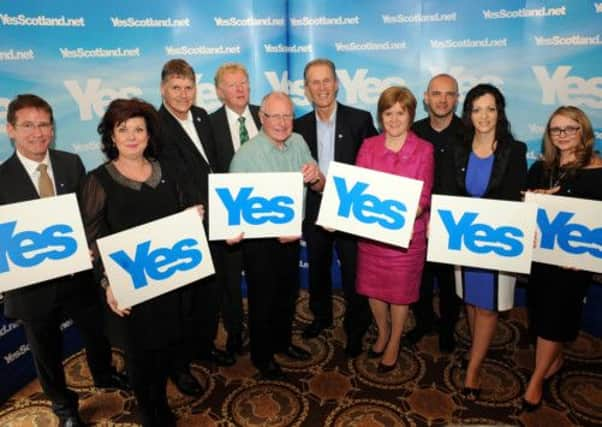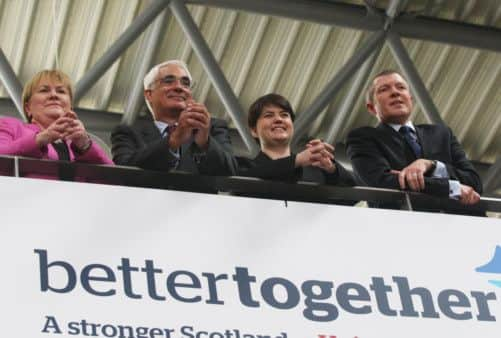Scottish independence: ‘Donations loophole’ fears


There are fears that donations worth thousands of pounds could secretly be funnelled through “permitted participant” bodies which sit outside the official campaigns.
Scots go to the polls on 18 September next year to vote on the country’s future in the UK, but the issue of funding has proved controversial.
Advertisement
Hide AdAdvertisement
Hide AdBoth camps, including the political parties on either side, have been told they can spend about £3 million each in the 16-week restricted period before the vote.


The Yes campaign has already reached this figure, with the help of £2m in donations from Euromillions lottery winners Colin and Chris Weir, while the No camp has secured a controversial £500,000 donation from oil magnate Ian Taylor.
Permitted participants are individuals or organisations, which must register to campaign if they are spending more than £10,000.
These bodies can spend up to £150,000, but Holyrood’s referendum committee was told yesterday that donations below £7,500 do not need to be declared. This could see multiple donations of thousands of pounds going to these bodies without their origin being declared.
Tom Mullen, professor of law at Glasgow University, said the threshold for declarations could be tightened up.
“I think there’s a case for lowering that trigger for reporting a donation to below £7,500,” he said.
“Quite a lot of substantial donations of several thousand pounds would not have to be disclosed.”
Labour MSP James Kelly had voiced concerns that the official Yes and No campaigns, or the main parties, could use the permitted participant system to effectively set up front organisations as an “outlet for surplus funding”.
Advertisement
Hide AdAdvertisement
Hide AdMSPs were also told the result of the independence referendum will not be “bought” by millionaire donors.
Green leader Patrick Harvie said: “Given the importance of the issue, some would argue we should do everything we can to reduce the power of millionaires in the whole debate.”
Neil Walker, professor of public law at the University of Edinburgh, told the referendum committee there were situations where there might be concerns over the gulf in spending power on either side.
But he said: “I don’t think this is that situation. There may be different amounts of money, but there’s still significant amounts of money on either side of the debate and a significant opportunity for all sides to their opinions across.
“I don’t see this as a situation where millionaires can buy the result.”
In addition, the prospect of a legal challenge to false statements made by either side of the independence debate would have little chance of success, the committee was told.
This would be part of the cut and thrust of politics, rather than the law, MSPs heard. Prof Mullen said: “The risk that people will make outrageous statements is something that we will have to combat by non-legal means.
“The other side has to fight back and put its point of view. Any attempt to try and regulate a distinction between legitimate debate and unfair and false statements is not feasible.”
Advertisement
Hide AdAdvertisement
Hide AdThe issue was raised by Mr Harvie, who asked if there was anything the Scottish Parliament should do to consider statements about the issues, rather than individuals.
Mr Harvie referred to a case which saw Labour MP Phil
Woolas lose his Westminster seat.
An election court ruled the result void because of false statements made about a rival.
Prof Walker added: “It’s an incredibly difficult thing to regulate. I can’t imagine how you would regulate. It has to be part of the cut and thrust of debate.”
SEE ALSO: